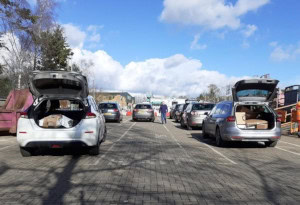The council replaced fortnightly mixed recycling collections with ‘community recycling points’ for 11 streets in the Normanton area in late 2014, citing “unreasonably high costs” for processing the material collected from households in the district due to contamination.

The blue recycling bins were also listed in a council report as “unattractive” and a potential fire risk to householders when left on pavements (see letsrecycle.com story).
Now, Derby has confirmed that two of the recycling points set up in place of collections have also been scrapped due to flytipping – leaving householders in Havelock Road and Leacroft Road without any facilities to recycle since last year.
Despite this the council argues it is not breaking the law, claiming it will re-site the recycling points at a later stage.
A council spokesperson said: “The cost of providing separate kerbside collections in this area was unreasonably high; we suffered from high levels of contamination and bins on streets. As a result comparative arrangements were made by installing mini recycling centres.
“Unfortunately our street cleansing teams have had to remove large volumes of fly tipping on a regular basis from these sites, we also received numerous complaints from residents living nearby. The centres have been removed temporally and we are currently in the process of looking for alternative sites to enable people living in the area to continue to recycle.”
Law
Under section 45(a) of the Environmental Protection Act 1990, councils have a duty to collect at least two types of recyclable waste, commingled or separated, unless the cost of doing so would be unreasonably high or comparable alternative arrangements are available.

These duties have since been reinforced by the Waste (England and Wales) Regulations 2011, which requires every collection authority to ensure separate recycling collections where technically, environmentally and economically practicable (TEEP).
Derby continues to claim that the cost of carrying out the collections is too costly. In 2014, the authority suggested that high levels of contamination in its recycling put it at risk of fines from waste contractor Biffa.
However, a Freedom of Information request put to the council by anti-incineration campaigner Simon Bacon revealed that no loads had been rejected at Biffa’s Victory Road sorting facility in 2013/14.
In 2014/15, Derby recorded the largest fall in recycling among collection authorities in England – dropping from 42% to 32% in the course of 12 months (see letsrecycle.com story). In 2010/11 the council achieved a recycling rate of 48% – just two percentage points shy of the UK 2020 target.
Reluctance
Environmental lawyer Angus Evers, partner at King & Wood Mallesons, suggested that a Court would likely be reluctant to order any council to reinstate recycling collections if challenged.
On collections being too costly or ‘other arrangements comparable’, Mr Evers said: “Those may seem like weak arguments, but the problem is that the duties are difficult to enforce. Although it would be possible to challenge the council’s decisions by judicial review, that would be expensive for any claimant and, even if a claim succeeded, any court would probably be reluctant to order the council to reinstate collections for recyclables.”
Recycling Act
Rules requiring councils to collect at least two types of recyclables, separated or commingled, were first enshrined in the Household Waste Recycling Act 2003, and later adopted into the Environmental Protection Act 1990.
Defra’s stance on the Act came under scrutiny in 2010, when Labour MP Joan Ruddock accused then environment minister Richard Benyon of “not being interested” in upholding it (see letsrecycle.com story).
*The relevant section of the Act (source: legislation.gov.uk)









Subscribe for free